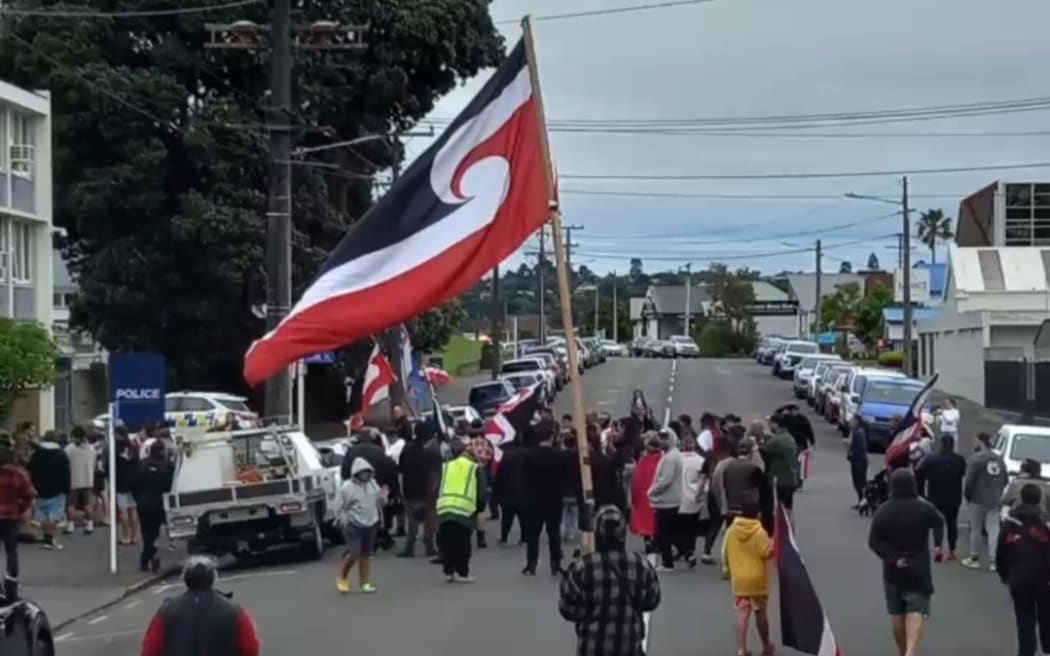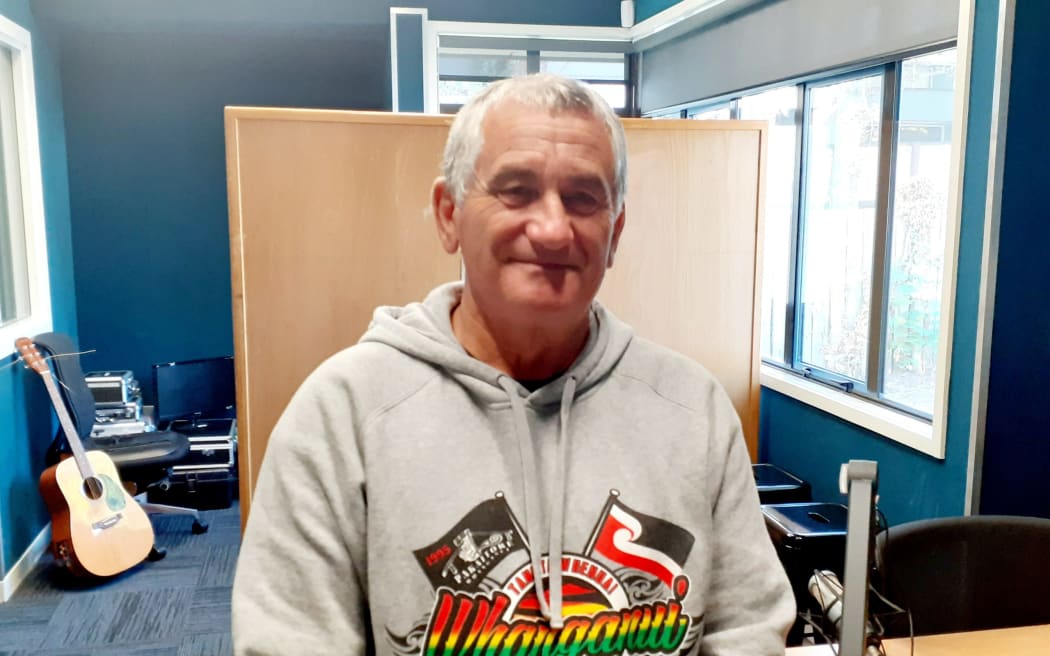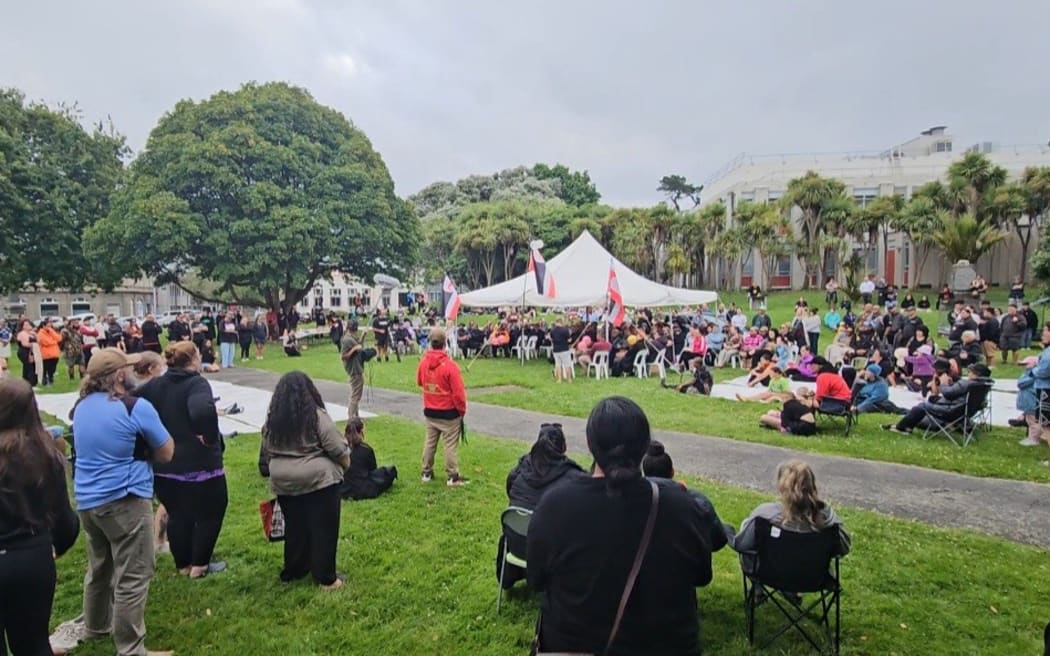
Protesters outside Whanganui Police station on 5 December, 2023. Photo: Supplied via LDR
Iwi leader Ken Mair says the turnout in Whanganui of hundreds of people in December to protest against government policies is “just the beginning” of action.
“That was an amazing turnout of people who are extremely concerned about what this coalition government is doing in the context of the attacks on Te Tiriti o Waitangi, te reo Māori, the health initiatives around smoking … even the Fair Pay Agreements, because that’s about supporting vulnerable people on low pay and a large number of our people, Māori and Pacific Island, are in that category.”
Iwi leaders are expected to travel from across the country to Tūrangawaewae Marae on Saturday in response to Te Paki o Matariki, a royal proclamation issued by Kiingi Tuuheitia late last year, calling for all iwi to unite.
It comes after mass protests were held around the country on 5 December, the day MPs were sworn into Parliament.
The day of action was called by Te Pāti Māori to protest against moves by the new government to remove the Māori Health Authority, reinterpret the Treaty of Waitangi, erase Māori names from Crown entities and ditch co-governance initiatives.

Mair said the Whanganui protest on 5 December began at Pākaitore on the banks of the Whanganui River before moving to the Pūtiki roundabout where more than 250 protesters blocked traffic on State Highway 3.
He said a hui to prepare at Pākaitore the night before drew about 600 people.
“I’m still astounded by the numbers. The following morning at least half of those people turned up ready for action.
“It was actually quite a wonderful feeling, really, to see the unity of our people.”

Iwi leader Ken Mair says there will be more action against government policies. Photo: LDR / Moana Ellis
Whanganui and neighbouring iwi are among those travelling to Ngāruawāhia on Saturday to meet with the Kiingitanga and iwi leaders over concerns about the new government.
Kiingi Tuuheitia has called on all iwi to attend a Hui-ā-Motu (national meeting) to work out a unified response. Thousands are expected at Tūrangawaewae Marae, with the hui expected to last at least six hours.
Speaking from the National Party caucus retreat on Thursday, Prime Minister Christopher Luxon said he was supportive of the national hui, but would not attend himself.
“We’re not front and centre in those conversations. It’s an opportunity for Māoridom to come together.”
Luxon said he has been meeting with iwi leaders across the country and looking at how the government can improve education and health for Māori.
“We are going to be a government that get things done for Māori and non-Māori.”

Hundreds of people turned out at Pākaitore historic reserve in Whanganui on 4 December, 2023, for protest action against the new government. Photo: Supplied via LDR
Hui-ā-Motu – The National Hui
The hui will include a series of workshops focusing on te reo and tikanga, national identity, economic wellbeing, and the Treaty of Waitangi and proposed reforms. A rangatahi forum will also be held. Keynote speakers include Sir Mason Durie, Sir Timoti Karetu and Che Wilson.
Tumu Mauri will sit in at each session as sources of mātauranga (knowledge). They include Sir Tipene O’Regan, Dame Silvia Cartwright and Gerrard Albert.
Sessions on the economy will feature Hone Harawira, Dave Letele, Tina Porou and Mavis Mullins. The te reo and tikanga forum will include Pania Papa and Tatere McLeod, while Dame Jenny Shipley, Aupito Sio, Rikirangi Gage, Ruakere Hond, Hinewehi Mohi and Dr Hana O’Regan will focus on national identity. The Treaty forum will include Tina Ngata, Pita Tipene and Rob Ruha.
The workshops will be led by journalists and Māori leaders including Julian Wilcox and Mihingarangi Forbes.
A plenary session at the end of the day will receive formal feedback from each of the breakout workshops and then iwi will present prepared statements.
The Kiingitanga has stipulated that the Hui-ā-Motu will be “inclusive and non-prescriptive, positive, affirmative and strengths-based, peaceful and future focused”. Parts of the hui will be livestreamed.
Archdeacon Ngira Simmonds, Kiingitanga chief of staff and private secretary to the King, said Kiingi Tuuheitia would carry the mauri (energy) of the Hui-ā-Motu to Rātana next week and Waitangi on 6 February.
“Here we can have further kōrero and use these hui to grow our Kotahitanga (unity),” Simmonds said.
“There will also be a report written about the hui, its discussions, outcomes and directives for our future – as decided by us all.”
The report will be drafted by the Waikato-Tainui College of Research and Development.
LDR is local body journalism co-funded by RNZ and NZ On Air.